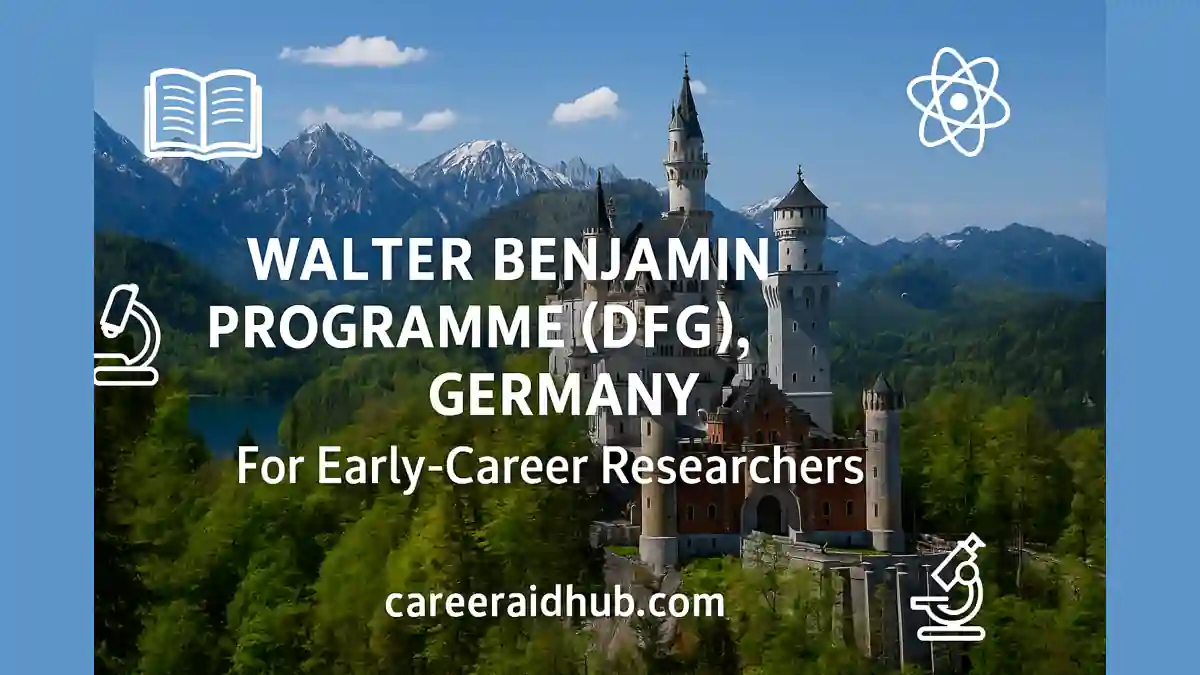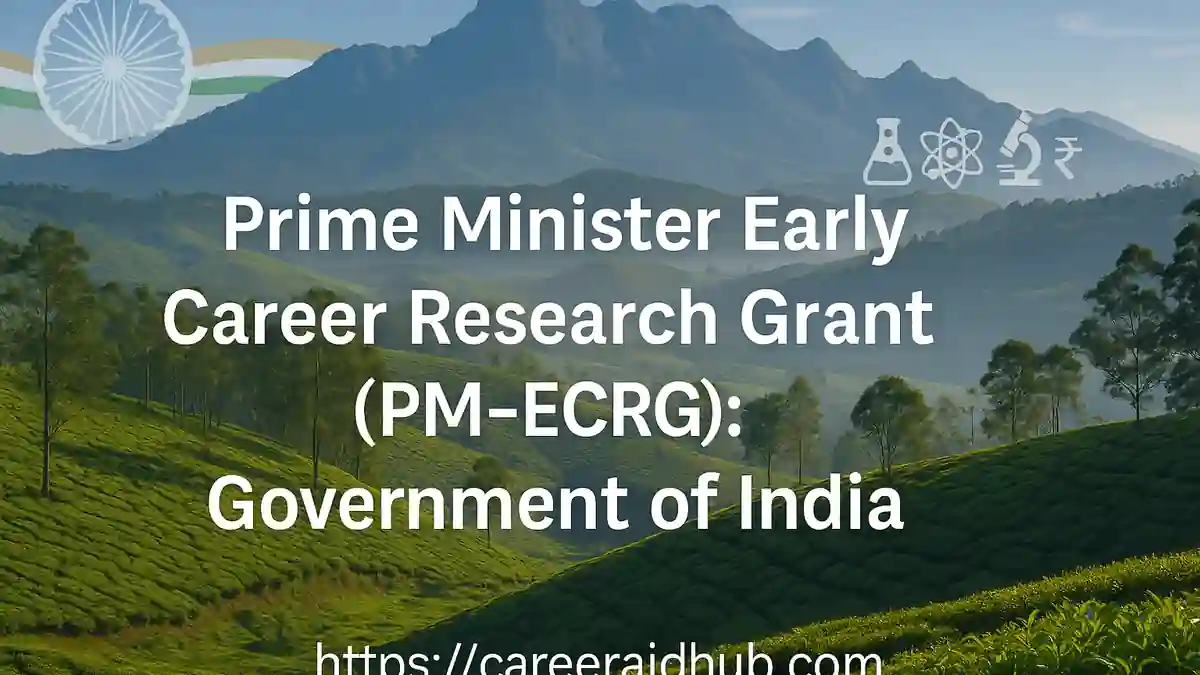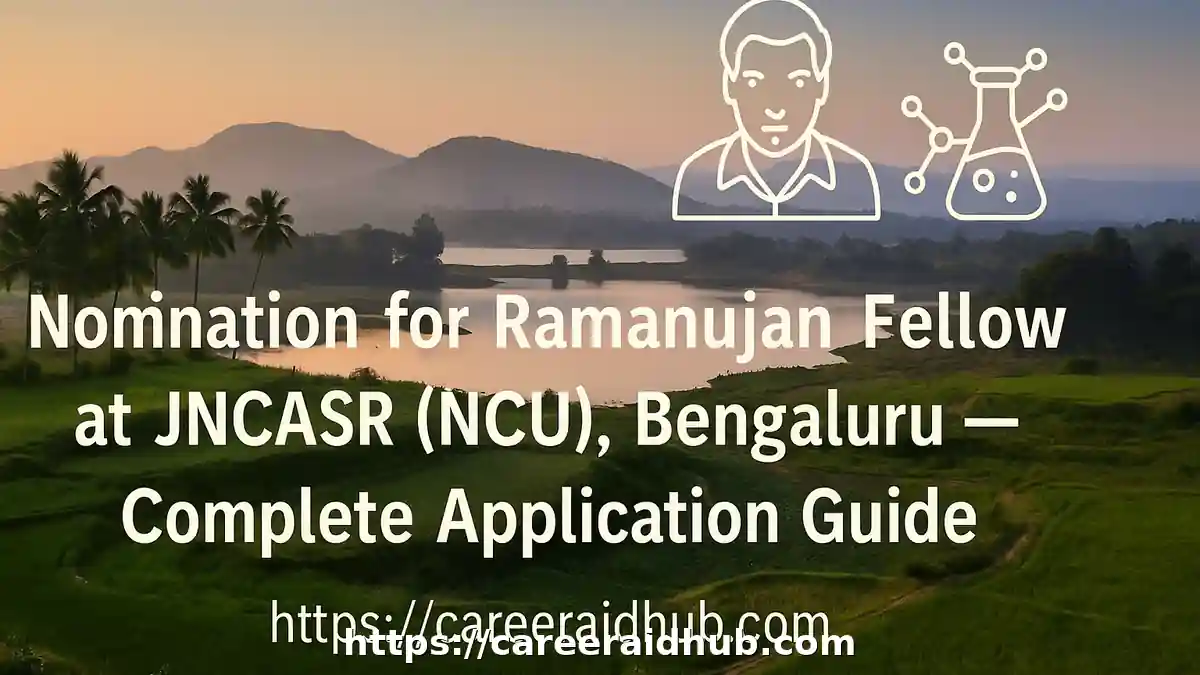Introduction
The Walter Benjamin Programme from the German Research Foundation (DFG) funds excellent postdoctoral researchers to conduct an independent, high-impact project in the best possible environment—either in Germany (as a Walter Benjamin Position) or abroad with a planned return to Germany (as a Walter Benjamin Fellowship). The scheme emphasizes researcher autonomy, scientific originality, and measurable career progression, supporting a compact work plan that converts resources into strong publications and enduring networks.
Launch an independent research agenda with the DFG’s Walter Benjamin Programme. Choose a German Position or an international Fellowship with return phase. Build networks, access world-class infrastructure, and deliver lead-author outputs that accelerate your next step—junior group leader, Emmy Noether, or tenure-track.
At a Glance
- Purpose: Empower outstanding postdocs to execute an independent research project at the best-fit host—in Germany or internationally with a structured return.
- Tracks:
- Walter Benjamin Position (employment at a German host institution)
- Walter Benjamin Fellowship (research stay abroad + planned return phase in Germany)
- Duration: Up to 24 months, calibrated to the project scope and chosen track.
- Field Coverage: All disciplines funded by the DFG (STEM, life sciences, humanities, social sciences, arts-based research where applicable).
- Ideal Profile: Early-career postdocs ready to lead, publish as senior/lead author, demonstrate mobility, and articulate a credible independence trajectory.
Why This Programme Stands Out
Researcher-Centric Flexibility
justify;">Unlike many project grants, the Walter Benjamin Programme places the
researcher at the center. You define the environment, assemble the methods, and shape the dissemination plan. Because the DFG funds your independence rather than a large team, you can move faster, pivot responsibly, and keep authorship leadership.
Strategic Mobility, Clear Outcomes
Additionally, the two-track design encourages strategy. Select a Position if German infrastructure or archives are decisive; select a Fellowship if a specific lab abroad offers unique methods, cohorts, or instruments—then return to consolidate your network and translate results in Germany.
Merit-Based Assessment
Crucially, evaluation focuses on project quality, feasibility, and your independence—not just institutional prestige. Reviewers look for a question of consequence, a realistic plan, and evidence that you drive the intellectual core.
Two Tracks, Two Strategies
1) Walter Benjamin Position (Germany)
You become an employee at a German host institution on a DFG-funded position to execute your project.
When this track fits best
- You require sustained access to German facilities, collections, or data enclaves.
- Your career path likely continues within the German research ecosystem.
- Teaching, graduate school activities, or co-supervision of students strengthens your profile and publication pipeline.
What the award typically covers
- Your salary
as per local standards and employment practices. - Project-specific costs (consumables, travel, publication fees, justified services).
- Access and integration at the host (space, infrastructure, compliance support).
How to position your case
Demonstrate that the German environment is decisive—for instance, a national archive, a specialized instrument time slot, longitudinal cohorts, or a secure data facility. Map facility access to specific milestones and outputs.
2) Walter Benjamin Fellowship (Abroad + Return)
You receive a DFG fellowship to work abroad where your question is best answered, coupled with a planned return phase at a host in Germany.
When this track fits best
- Your project depends on unique expertise, datasets, or methods available only abroad.
- You aim to import techniques back to Germany and extend the work upon return.
- You seek international visibility and collaborative momentum early in your career.
What the award typically covers
- A monthly fellowship rate for living costs abroad.
- Travel and—subject to rules—family benefits.
- A return-to-Germany plan with a host that anchors continued outputs and future funding bids.
How to position your case
Detail exactly why this foreign lab matters
(e.g., rare assays, frontier computation, field sites, curatorial access). Then, explain how the
return phase converts new skills and data into
lead-author publications and competitive follow-on proposals.
Eligibility and Applicant Profile
Core Requirements
- Doctorate completed (or dissertation formally submitted with proof) by the time of application.
- Early-career focus: The programme targets researchers shortly after the PhD who can run an independent sub-project and publish as lead.
- Independence & Mobility: Show separation from your PhD adviser’s agenda and, where appropriate, geographic or institutional mobility aligned with your methods.
- Scholarly Quality: A field-appropriate track record—articles, data/software releases, editions, or performances—demonstrating rigor and originality.
Strengthening Your Fit
- Cite conceptual contributions you led.
- Show method ownership (pipelines, instruments, or archives you can drive).
- Present a tight work plan with verifiable outputs.
Host Requirements
Fit and Feasibility
Your host must provide the decisive missing pieces: infrastructure, secure data access, expert supervision, or curatorial permissions. Explicitly list facilities, time allocations, compliance procedures, and data-sharing agreements.
Mentoring and Integration
Name a host mentor and specify frequency of meetings, lab integration, colloquia, and co-mentoring of students. Emphasize guidance that supports, not overshadows, your independence.
Hosts confirm space, access, and compliance. For a German Position, employment conditions apply. For a Fellowship abroad, outline the return host in Germany and how the project continues there.
What the Funding Can Cover
- Your employment (Position) or fellowship (Fellowship track).
- Project expenses: consumables, fieldwork, travel to archives or conferences, publication charges, specialized software or data licenses.
- Mobility: travel and, where eligible, family-related benefits.
- Dissemination: open-access publication fees and reproducible artifacts (data, code, editions), where justified.
Budgeting Principle: Tie every cost to a method and a milestone. If an expense does not accelerate a promised output, reconsider it.
How to Apply: Documents and Structure
1) Project Description (Core)
- Research question and relevance: State the problem crisply and situate it within a timely scholarly conversation.
- State of the art and gap: Map the frontier and show your precise contribution.
- Methods & work plan: Detail tasks, datasets/archives, equipment, and analysis pipelines.
- Milestones & outputs: Quarter-by-quarter outputs (papers, editions, tools, data releases).
- Risk management: Alternatives if access or recruitment slips.
- Ethics & compliance: IRB/ethics approval, data protection, export controls, or permits.
2) CV with Publications
Use field-appropriate norms. Emphasize lead/first-author outputs, datasets/software, curated collections, or critical editions.
3) Host Letters and Integration Plan
Document access, mentoring cadence, and how you plug into the host’s research culture.
4) Budget & Justification
Keep it parsimonious. Cross-walk every line item to a method and deliverable.
5) Fellowship-Specific (Abroad + Return)
Include a return plan in Germany and name the environment that converts your new skills into sustained outputs.
Selection Criteria: What Reviewers Look For
- Originality & significance: A question that advances the field, not just the topic.
- Feasibility: A realistic schedule and credible access to everything you need.
- Independence: Evidence of conceptual leadership and distinct publication lines.
- Host complementarity: The host adds decisive value rather than duplicating capacity.
- Career development: The project creates a clear bridge to your next independent step.
Timeline and Planning
Submissions: The DFG accepts applications continuously; peer review and committee cycles follow the programme’s procedures. In practice, allow several months from submission to decision.
Planning Tips
- Start early to secure letters, permits, and access.
- Synchronize visa, housing, school terms, and instrument time.
- Target at least one lead-author manuscript during or shortly after funding.
- For a fellowship, sequence abroad → return to maintain publication momentum.
Next Cycle (forecast): Expect rolling submission with periodic decisions; we will update soon when formal review windows are published for the upcoming cycle.
Writing Tips That Lift Your Score
Lead With the Question
Open with the intellectual problem and the advance you will produce. Keep the narrative evidence-based and concrete.
Show the Method on One Page
Include a compact figure or table mapping data → analysis → output. Reviewers appreciate clarity.
Quantify Added Value
Name the instrument, dataset, or archive and specify the access route (time allocation, license, curator approval).
Commit to Reproducibility
Where appropriate, plan pre-registration, open data, code release, or documented editions. This often improves credibility and citation potential.
Signal Independence
Differentiate your proposal from doctoral-thesis work and demonstrate original lines you now lead.
Common Pitfalls—and How to Fix Them
- Vague feasibility: Provide week-by-week tasks for the first two quarters.
- Host as ornament: Specify exact meeting cadence, facilities, and access procedures.
- Over-reach: Promise two or three high-value outputs rather than a diffuse list.
- Budget without logic: Link every cost to a named milestone.
- Fellowship with weak return: Name the return host, planned outputs, and next grant targets (e.g., Emmy Noether).
Next Steps
- Identify your best-fit host—Germany (Position) or abroad with a return host in Germany (Fellowship).
- Draft a two-page concept: question, frontier, methods, outputs, host value, timeline.
- Secure letters and confirm facility or archive access.
- Build a lean budget mapped to milestones and compliance.
- Submit a polished file and prepare dissemination venues.
Feature Table
Feature | Details |
Program Name | Walter Benjamin Programme |
Host Country/Region | Germany (Position) or Abroad + Return to Germany (Fellowship) |
Funded By | German Research Foundation (DFG) |
Duration | Up to 24 months |
Study Mode | Full-time, in-person at the host; mobility supported |
Eligibility | Early-career postdocs with completed doctorate or submitted thesis; strong independence and fit with host |
Financial Support | Salary (Position) or fellowship (abroad), project expenses, travel; family benefits subject to rules |
Fields of Study | All DFG-funded disciplines |
Deadline | Rolling submission; decisions periodic — we will update soon |
Official Website | Click here |
Conclusion
The Walter Benjamin Programme is purpose-built for postdocs who are ready to own a question, choose the best environment, and convert resources into lead-author outputs. By aligning your track choice with your methods, mapping costs to milestones, and securing a host who adds decisive value, you give reviewers a clear reason to fund you—now and for the next step in your independent career.
References
- DFG—Walter Benjamin Programme
Frequently Asked Questions (FAQs)
Who is eligible for the Walter Benjamin Programme?Early-career postdocs with a completed doctorate or submitted thesis, strong independence, and a host commitment in Germany or abroad, depending on the chosen track.
What are the two tracks in the Walter Benjamin Programme?You can apply for a Walter Benjamin Position in Germany or a Walter Benjamin Fellowship abroad with a planned return phase to Germany.
How long does Walter Benjamin funding last?Funding usually runs up to 24 months, tailored to your project scope, host environment, and chosen track.
Which disciplines does the Walter Benjamin Programme support?All DFG-funded fields qualify, including STEM, life sciences, social sciences, humanities, and interdisciplinary research areas.
What costs can I include in a Walter Benjamin budget?You may request employment or fellowship funding, travel, project consumables, data or software licenses, and justified publication costs aligned with milestones.
Do I need a host letter for the Walter Benjamin application?Yes. A strong host commitment confirming access, integration, and mentoring is essential for both Position and Fellowship tracks.
How competitive is the Walter Benjamin Programme for postdocs?Competition is strong. Reviewers prioritize originality, feasibility, host fit, and clear evidence of applicant independence and leadership.
Can I include family benefits in a Walter Benjamin Fellowship?In certain cases, family-related allowances may apply to fellowships abroad, subject to programme rules and host country conditions.
What strengthens a Walter Benjamin application most?A crisp research question, a realistic work plan, verifiable access to facilities or data, measurable outputs, and a credible independence trajectory strengthen your case.
When should I apply to the Walter Benjamin Programme?Submissions are accepted on a rolling basis. However, plan several months for review, and coordinate visas, access permissions, and housing early.










